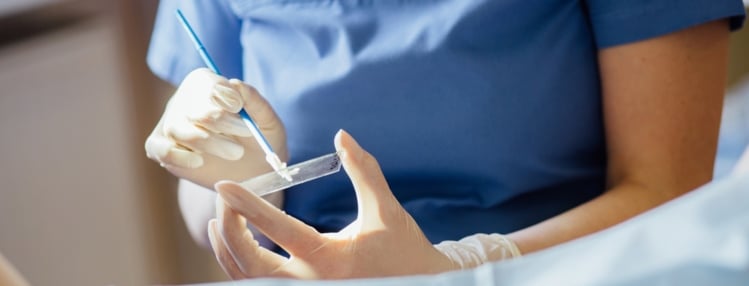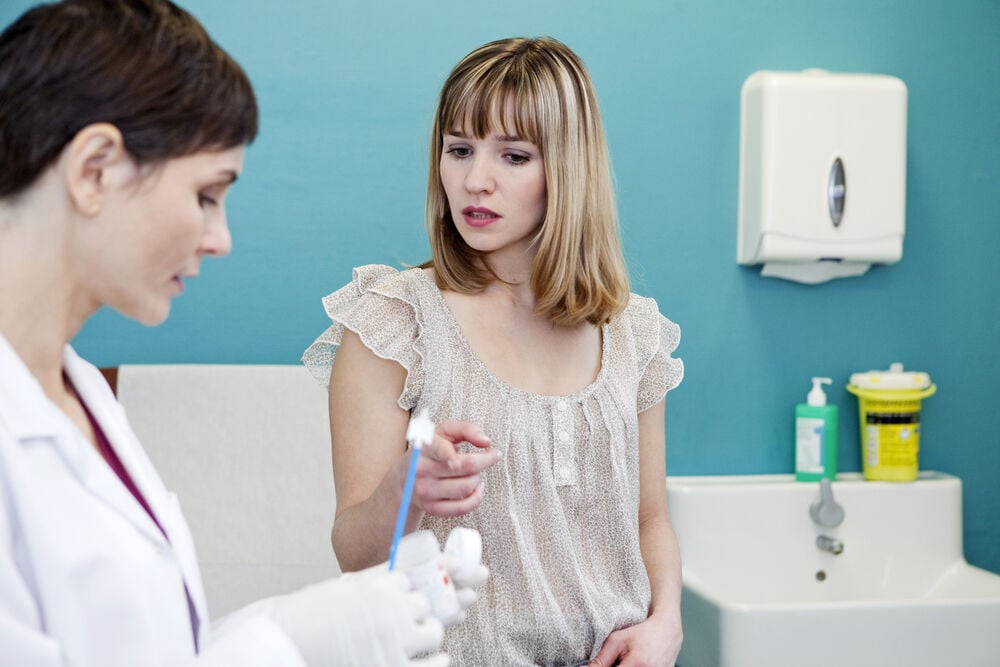A Papanicolaou test, or Pap smear, is normally performed at a regular gynecological visit. Doctors generally recommend getting a Pap test every three years for women ages 21 to 65.
-
Tracking cycle
-
Getting pregnant
-
Pregnancy
-
Help Center
-
Flo for Partners
-
Anonymous Mode
-
Flo app reviews
-
Flo Premium New
-
Secret Chats New
-
Symptom Checker New
-
Your cycle
-
Health 360°
-
Getting pregnant
-
Pregnancy
-
Being a mom
-
LGBTQ+
-
Quizzes
-
Ovulation calculator
-
hCG calculator
-
Pregnancy test calculator
-
Menstrual cycle calculator
-
Period calculator
-
Implantation calculator
-
Pregnancy weeks to months calculator
-
Pregnancy due date calculator
-
IVF and FET due date calculator
-
Due date calculator by ultrasound
-
Medical Affairs
-
Science & Research
-
Pass It On Project New
-
Privacy Portal
-
Press Center
-
Flo Accuracy
-
Careers
-
Contact Us
Can You Get a Pap Smear on Your Period?

Every piece of content at Flo Health adheres to the highest editorial standards for language, style, and medical accuracy. To learn what we do to deliver the best health and lifestyle insights to you, check out our content review principles.
Women who are 30 or older can wait five years between Pap tests if the procedure is combined with testing for HPV.
Many women schedule their gynecological exam several months in advance. During that time, your menstrual cycle might be pretty predictable or utterly irregular. Because of this, you may or may not end up being on your period when it comes time for the visit. So, is it okay to get a Pap smear while on your period?
Pap smear procedure: how and when you should do it
The Pap test has been used to detect cervical cancer for more than 75 years and is usually performed during an annual OB-GYN exam. The Centers for Disease Control and Prevention recommend every sexually active woman to have a pelvic examination to rule out different medical conditions including cancer. This is especially important for women over the age of 30, since they are at a higher risk.
The majority of cervical cancer cases are caused by the human papillomavirus (HPV). This is a common virus that can be transmitted through intercourse and is considered a standard sexually transmitted infection. Most women that have been exposed to HPV do not have any symptoms, and it can go undetected for a long time before any symptoms become apparent.
During the exam with your gynecologist, the doctor will perform a pelvic exam and collect cells from your cervix. This sample is then sent off to a laboratory for testing. Typically, this only needs to be done once every few years unless you are experiencing unexplained symptoms or have an abnormal result from the laboratory testing. If this is the case, your doctor will have you come back in for a follow-up to confirm the findings and determine if additional treatment is necessary.
When you schedule a gynecological exam that includes a Pap smear, most gynecologists will request that you have this exam when you do not have your period. Can you get a PAP smear on your period? Only if it is absolutely necessary, as the results may not be accurate. There are other things that you may need to do (or avoid doing) to prepare for your Pap smear. You should avoid douching; intercourse; and any vaginal medicines or spermicidal foams, creams, or jellies for two days before a Pap smear, as these may wash away or obscure abnormal cells.

Will a gynecologist perform a Pap smear while you’re on your period? The answer is maybe, but not likely. You might be told that you need to reschedule if the appointment falls on a day when you have your period.
Will getting Pap smear while on your period affect your test results?
Getting a Pap during your period can change the results of the test. The pH of your vagina changes slightly during your period, and the presence of blood may make it difficult for the gynecologist to collect a clean sample of cervical cells. A good sample of these cells is necessary to rule out the presence of cervical cancer. Your doctor will typically ask that you reschedule your appointment to avoid abnormal results from the Pap smear and the need to repeat the test.
Getting a Pap smear with a light period or spotting
If you have your period, it’s more likely that you’ll be able to go through with your Pap test if you are experiencing light bleeding or spotting. This small amount of blood is less likely to affect the results of the test. However, the best time to have a Pap test done is about two weeks after the start of your last period.
When women experience abnormal menstrual cycles or spotting, it could indicate a medical issue. This is not the time to worry about how accurate the Pap test will be if you’re on your period. Regardless of where you are in your cycle, call your primary care provider or gynecologist for an examination. When there are changes in your menstrual cycle or symptoms that you can’t explain, seek medical advice. Your doctor can determine what’s causing the changes and either prescribe medication or recommend treatment that will be more effective if diagnosed early.
Take a quiz
Find out what you can do with our Health Assistant


Hey, I'm Anique
I started using Flo app to track my period and ovulation because we wanted to have a baby.


The Flo app helped me learn about my body and spot ovulation signs during our conception journey.


I vividly
remember the day
that we switched
Flo into
Pregnancy Mode — it was
such a special
moment.
Real stories, real results
Learn how the Flo app became an amazing cheerleader for us on our conception journey.




